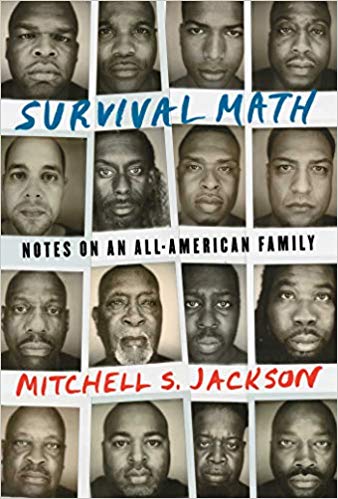Award-winning writer Mitchell S. Jackson’s “Survival Math” is a complicated piece of non-fiction. It defies category: it is a non-fiction work that is biography, essay, memoir, interviews, and history. The reader leaves the work with the views and opinions of an educated insider who survived by understanding the math.
The text begins with the Jackson family’s biographical history, and then it expands into the origins of blacks in Oregon and western America. With the use of broad historical bush strokes, Jackson engages the reader in the politics of the era, the race relations of the time, and the entrepreneurial spirit of blacks: Post-slavery, post-Civil War, during reconstruction, while surviving Jim Crow, and through the Civil Rights movement. While providing this historical information, Jackson inserts his memoir without the restrictions of a chronological timeline.
As Jackson travels back and forth across decades, the reader meets people who grow in importance with the development of the memoir. Jackson’s memories are not centered around events from his life alone; he includes events that have affected his family and the black community. A reader meets his mother and father through his recollections of his grandparents’ struggles and accomplishments. While revealing the generational struggles of a black family, the text explores America’s racist systemic attack on Jackson, his peers, and family members a generation before him. Again, Jackson’s memoir is larger than an individual collection of life memories and events; it also includes the events and issues of his community.
Jackson’s discussion of problematic drug usage within the black community is from an insider’s view, and as an insider, he identifies causes. And his identification of the causes includes the actual names of people. This documentation will both shock and inform readers. There are few innocents involved in the drug epidemic, and Jackson explores greed, bad judgment, immaturity, and child abuse as strong contributing factors. There is little, if any, sugar coating or excuses offered for drug usage in the black community; again, Jackson’s view is from the inside out, but as a well-read and educated insider. The reader will find his comments far from common, standard, or expected– this is also the case with his observations concerning the sex trade.
“Cause we raised you to pimp” was a declaration form Jackson’s Uncle Z. Again, Jackson offers a view from an insider who has been educated. The sex trade is discussed in the memoir from a family’s involvement, Jackson’s family. The reader feels the humanity of the sex trade worker: pimp, trick, and prostitute. Jackson’s empathetic view informs beyond a journalistic or sociological view, and the reader gains an understanding of why “the game is sold not told.”
Arguably, the most potent prose of the text are the sections Jackson labels “Survivor Files.” These are slices of life from individuals that have aided in Jackson’s development of self: he refers to these individuals as “The Pops.” In these sections, Jackson records “The Pops” standing strong against opposition, obstaclesthat were either self-created and or created by systemic racism. Reading the sections elicits stark emotional responses from the reader which range from scolding the protagonist of “Files” or wishing to offer the protagonist guidance through the pages.




